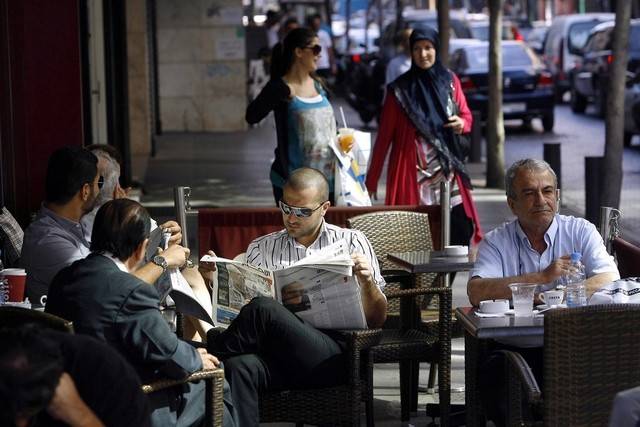Jesse Rosenfeld

Lebanon used to be a magnet for regional and global powers to fight out their proxy wars, reducing the country to rubble and scarring its people. Now the coastal capital of Beirut is a business hub. Its cafes and bars bustle while, politically, the city is a soap box for a war of words about battles that are fought elsewhere.
From conflicts in Yemen to Syria, major players make their positions known through their local Lebanese allies. Speeches by Hizbollah leader Hassan Nasrallah that blame Saudi Arabia for aggression in Yemen routinely face retorts by former prime minister Saad Hariri citing Iranian backing of the Houthis as the cause of the violence.
Yet the miracle of Lebanon is that despite the spillover from the Syrian civil war, it has continued to stay above the fray. There is mutual interest in the country’s capital being a place for back channel negotiations and for business from all sides to make a profit. The weak central government, unable to decide on a president for the past year, levels the playing field and the strong factional divides give a voice to competing powers.
This is not to say the divisions plaguing the Middle East aren’t having a profound effect on Lebanon. The country is being reshaped socially, demographically and economically by the war in Syria.
More than a million Syrian refugees have crossed the border and remain unrecognised. Many lack any social support and are condemned to live on the streets or move into already overcrowded Palestinian refugee camps. Their impoverishment is evident all around Beirut.
Whole families group together on flattened cardboard boxes in the upscale neighbourhoods, next to apartment towers where the rents are always rising and there is no shortage of demand. This inequality and lack of basic services only fuels local tensions and increases hostility towards displaced Syrians.
At the same time new alliances are being created to take on the rise of jihadists, while old regional tensions continue to fuel decades of local political divisions.
Hizbollah and the Lebanese army have been waging an intense battle against ISIL and Jabhat Al Nusra in the Qalamoun mountains. Christian villages along the Syrian border, like Ras Baalbec, are armed and mobilised by Hizbollah and increasingly direct their hostilities at the Lebanese Sunni town of Arsal, often accused of providing support for both Jihadists and the Free Syrian Army.
The residents of these picturesque hilly communities live in the shadow of war and talk about the potential for Syria’s conflict to set off intra-Lebanese hostilities.
But the suffering from Lebanon’s own civil war, which ended in 1990, is still fresh in people’s memory. It’s an experience that has left many tolerating the country being a crisis-ridden refuge for those fleeing Syria and rear line for proxy wars around region.
As a result, people in Lebanon find alternatives for coping with the chaos all around them. Beirut’s vibrant art and culture scene is being transformed by Syrian exiles who express the horrors of these wars and the animosities they breed through music.
On any given night you will find bands like Khebez Dawle playing in Lebanese night clubs, matching the intensity of their post-rock crescendos with heart piercing lyrics of lives destroyed and a generation shattered by unending bloodshed. In Beirut’s Western Hamra neighbourhood hip-hop groups like Fareeq El Atrash have come to represent a culture created by the war on the borders mixing with an international city.
Hizbollah may be fuelling these conflicts by propping up the Assad regime, fighting from Aleppo to Idlib, but it is also appears essential to maintaining stability in a city that allows these songs of war to entertain crowds.
Even in Lebanon’s notorious and nefarious hashish trade, enemies who fight to the death across the border find a way to do business in the cedar nation.
On a trip to the Bekaa valley in April, a hash farmer who had lost a relative at the hands of ISIL, told me that he had also been involved in a large drug deal with the jihadists.
He swore he would take violent retribution against anyone who had helped with the abduction and killing of his family member, but that didn’t stop him relying on those from the town connected to the takfiri groups to coordinate the hash sale.
It is not a strong state or political unity that has mostly kept Lebanon from becoming a theatre of combat in the conflicts on its doorstep. Rather, it is regional forces seeing an interest in using the country for business that has so far kept them from ripping it apart.
Jesse Rosenfeld is a Canadian journalist based in Beirut



